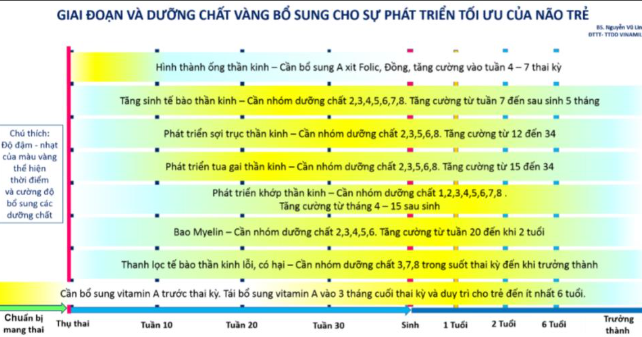
Golden Nutrition for Optimal Brain Development in Early Life
Key Milestones in Brain Development During Early Life
Around 22 days after conception, neural plates begin to fold inward, forming the neural tube, which gradually develops into the brain and spinal cord. This process requires folic acid, copper, and vitamin A. By the seventh week of pregnancy, cell division begins within the neural tube, leading to the formation of a complete nervous system through five key processes:

1. Neurogenesis (Gray Matter Formation)
This process starts around week 7 of pregnancy and accelerates until 4–5 months after birth, then continues at a slower pace until adulthood.
2. Axon and Dendrite Growth (Gray Matter)
Axons begin growing from week 7 of pregnancy and continue developing for at least 2 years after birth. In some brain regions, axons fully develop between weeks 15 and 32 of pregnancy. Dendrites start forming around week 15 and complete their growth by age 2.
3. Synapse Formation and Refinement
Synapses begin forming around week 23 of pregnancy and continue throughout life. The density of synapses peaks at different times depending on the brain region. For example, the visual cortex peaks between months 4–12, while the prefrontal cortex peaks around month 15. Synaptic pruning occurs simultaneously to eliminate faulty connections and continues into adulthood.
4. Myelination
Myelination is the process of forming white matter around axons to speed up neural transmission. It begins between weeks 12–14 of pregnancy and continues into adulthood. The most intense phase occurs from mid-pregnancy to age 2. Before birth, myelination is strongest in brain regions responsible for orientation and balance; after birth, it focuses on hearing, vision, and language development.
5. Programmed Cell Death (Apoptosis)
This process eliminates defective or harmful neurons and occurs from pregnancy through adulthood. It is regulated by neurotrophic factors such as BDNF (Brain-Derived Neurotrophic Factor) and IGF-1 (Insulin-Like Growth Factor-1).
Essential Nutrient Groups for Brain Development During Pregnancy
1. Folic Acid, Copper, and Vitamin A
This group includes folic acid (vitamin B9), copper, and vitamin A—key nutrients that support the differentiation and development of neural tissue from the neural plate into the neural tube, which later forms the central nervous system. This process occurs early, between weeks 4–7 of pregnancy.
Food sources:
- Folic acid: liver, egg yolk, legumes, whole grains, cruciferous vegetables, bananas, oranges.
- Copper: meat, eggs, dairy, seafood.
- Vitamin A: milk, liver, eggs, fish.
2. B-Complex Vitamins
B vitamins such as B1 (thiamine), B2 (riboflavin), B3 (niacin/niacinamide), B5 (pantothenic acid), B6 (pyridoxine and its derivatives), B7 (biotin), B9 (folic acid), and B12 (cobalamins) play a vital role in neural stem cell proliferation, neuron and glial cell development, and synaptic formation in the cerebral cortex and cerebellum. They also support myelin synthesis.
Food sources: whole grains, brown rice, leafy greens, eggs, chicken, citrus fruits, nuts (peanuts, cashews, walnuts), large red beans, bananas. Vitamin B5 is found in most foods.
3. High-Protein and Energy-Rich Nutrition
Adequate protein and energy intake helps prevent fetal protein-energy malnutrition, which can reduce neuron count, axon and dendrite growth, synaptic density, and cortical gray matter. It also affects myelination and the production of neurotrophic factors like BDNF and IGF-1.
Food sources: meat, eggs, fish, dairy products, nuts, legumes, sweet and fatty vegetables.
4. Long-Chain Unsaturated Fatty Acids
Includes DHA (Docosahexaenoic Acid), ARA (Arachidonic Acid), and Omega 3-6-9 fatty acids. These are essential for synthesizing membrane phospholipids, which are key components of cell membranes, synapses, and myelin structure.
Food sources: milk, seafood, fish oils, eggs, beans, nuts.
5. Iron
Iron is crucial for synthesizing ribonucleotide reductase, an enzyme that regulates central nervous system cell division. Iron deficiency may lead to reduced brain size, shorter axons and dendrites in the hippocampus, and impaired learning, orientation, and long-term memory. It also affects synaptic transmission and myelin synthesis.
Food sources: milk, eggs, fish, seafood, meat, liver, whole grains, legumes, dark leafy greens.
6. Iodine
Iodine supports the synthesis of hormones that regulate central nervous system development. Deficiency increases the risk of stillbirth, congenital hypothyroidism, reduced brain weight, impaired myelination, and decreased synaptic branching in visual-auditory regions and the cerebellum.
Food sources: spinach, celery, seafood, sea salt, iodized salt, eggs.
7. Zinc
Zinc is essential for DNA synthesis and cell division, and it is a component of many enzymes involved in brain function. Zinc deficiency can reduce neuron count and mass in the cerebellum, limbic system, and cortex, impair dendritic branching, and limit growth hormone activity.
Food sources: milk, eggs, fish, meat, whole grains, legumes.
8. Choline
Choline promotes neural stem cell proliferation, stimulates neuron division, and serves as a precursor for neurotransmitters. It also regulates programmed cell death. Choline deficiency during pregnancy can cause irreversible developmental issues.
Food sources: milk, eggs, fish, meat, liver, seafood, legumes, vegetables.
Dr. Nguyễn Vũ Linh – Head of Vinamilk Nutrition Center
Reference
1. Black RE, Victora CG, Walker SP, et al. Maternal and child undernutrition and overweight in low-income and middle-income countries. Lancet. 2013;382:427–451. Link
2. Couperus JW, Nelson CA. Early brain development and plasticity. In: McCartney K , Phillips D , eds. The Blackwell Handbook of Early Childhood Development. Malden, MA: Blackwell Publsihing; 2006:85–105. Link
3. Johnson MH. Functional brain development in humans. Nat Rev Neurosci. 2001;2:475–483. Link
4. Antonow-Schlorke I, Schwab M, Cox LA, et al. Vulnerability of the fetal primate brain to moderate reduction in maternal global nutrient availability. Proc Natl Acad Sci U S A. 2011;108:3011–3016. Link
5. Coti Bertrand P, O'Kusky JR, Innis SM. Maternal dietary (n-3) fatty acid deficiency alters neurogenesis in the embryonic rat brain. J Nutr. 2006;136:1570–1575. Link
6. Uauy R, Dangour AD. Nutrition in brain development and aging: role of essential fatty acids. Nutr Rev. 2006;64(Suppl):S24–S33. discussion S72–91. Link
7. Rao R, Tkac I, Schmidt AT, et al. Fetal and neonatal iron deficiency causes volume loss and alters the neurochemical profile of the adult rat hippocampus. Nutr Neurosci. 2011;14:59–65. Link
8. Beard J. Recent evidence from human and animal studies regarding iron status and infant development. J Nutr. 2007;137(Suppl):524S–530S. Link
9. de Escobar GM, Obregon MJ, del Rey FE. Iodine deficiency and brain development in the first half of pregnancy. Public Health Nutr. 2007;10:1554–1570. Link
10. Sandstead HH. W.O. Atwater memorial lecture. Zinc: essentiality for brain development and function. Nutr Rev. 1985;43:129–137. Link
11. McNall AD, Etherton TD, Fosmire GJ. The impaired growth induced by zinc deficiency in rats is associated with decreased expression of the hepatic insulin-like growth factor I and growth hormone receptor genes. J Nutr. 1995;125:874–879. Link
12. Molloy AM, Kirke PN, Troendle JF, et al. Maternal vitamin B12 status and risk of neural tube defects in a population with high neural tube defect prevalence and no folic acid fortification. Pediatrics. 2009;123:917–923. Link
13. Chang SJ, Kirksey A, Moore DM. Effects of vitamin B6 deficiency on morphological changes in dendritic trees in Purkinje cells in developing cerebellum in rats. J Nutr. 1981;111:848–857. Link
14. Grantham-McGregor SM, Powell CA, Walker SP, et al. Nutritional supplementation, psychosocial stimulation, and mental development of stunted children: the Jamaican Study. Lancet. 1991;338:1–5. Link
15. Pollitt E. Early supplementary feeding and cognition: effects over two decades. Monogr Soc Res Child Dev. 1993;58:1–99. Link
16. Gardner JM, Powell CA, Baker-Henningham H, et al. Zinc supplementation and psychosocial stimulation: effects on the development of undernourished Jamaican children. Am J Clin Nutr. 2005;82:399–405. Link
17. Glenn MJ, Gibson EM, Kirby ED, et al. Prenatal choline availability modulates hippocampal neurogenesis and neurogenic responses to enriching experiences in adult female rats. Eur J Neurosci. 2007;25:2473–2482. Link
18. Prado EL, Dewey KG. Nutrition and brain development in early life. Alive & Thrive Technical Brief January 2012; (Issue 4). Link
19. Moore JK, Perazzo LM, Braun A. Time course of axonal myelination in the human brainstem auditory pathway. Hear Res. 1995;87:21–31. Link
20. Unay B, Sarici SU, Ulas UH, et al. Nutritional effects on auditory brainstem maturation in healthy term infants. Arch Dis Child Fetal Neonatal Ed. 2004;89:F177–F179. Link
21. Georgieff MK. Nutrition and the developing brain: nutrient priorities and measurement. Am J Clin Nutr. 2007;85(Suppl):614S–620S. Link
22. Hoddinott J, Malussio JA, Behrman JR, et al. Effect of a nutrition intervention during early childhood on economic productivity in Guatemalan adults. Lancet. 2008;371:411–416. Link
23. Innis SM. Human milk and formula fatty acids. J Pediatr. 1992;120(4 Pt 2):S56–S61.
24. Kramer MS, Aboud F, Mironova E, et al. Breastfeeding and child cognitive development: new evidence from a large randomized trial. Arch Gen Psychiatry. 2008;65:578–584.
25. Qawasmi A, Landeros-Weisenberger A, Leckman JF, et al. Meta-analysis of long-chain polyunsaturated fatty acid supplementation of formula and infant cognition. Pediatrics. 2012;129:1141–1149.
26. Christian P, Morgan ME, Murray-Kolb L, et al. Preschool iron-folic acid and zinc supplementation in children exposed to iron-folic acid in utero confers no added cognitive benefit in early school-age. J Nutr. 2011;141:2042–2048.
27. Sandstead HH, Frederickson CJ, Penland JG. History of zinc as related to brain function. J Nutr. 2000;130(Suppl 2):496S–502S.
28. Hamadani JD, Fuchs GJ, Osendarp SJ, et al. Zinc supplementation during pregnancy and effects on mental development and behavior of infants: a follow up study. Lancet. 2002;360:290–294.